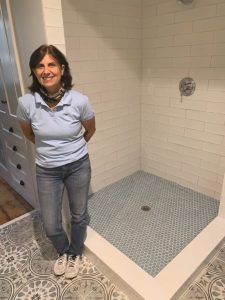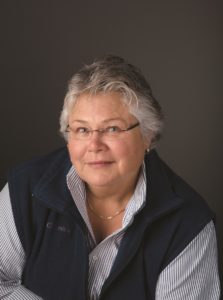With Women’s Week in view, the Independent asked three Outer Cape women to tell us what it’s like to make themselves at home working in what is still seen as a man’s world — the building trades.
Jean Marino, Master Tiler
“It is true that, as a woman in the trades, I have had to prove myself more than a man would have to,” says Jean Marino, a master tiler who runs her own tiling and marble business in Provincetown. To make it, she said, “you have to be very good, very serious at what you do.”
Marino studied sociology. She was a medical social worker in a Boston nursing home when she came to Provincetown for an October weekend that ended up changing her direction for good. “I met someone,” Marino says.

Already unhappy with the health-care system, Marino decided to stay here. So, she did what most newcomers do — she found work at Christy’s, where, she says, she “was a terrible waitress.” It was there that a local carpenter offered her an out. For $8 an hour, she could learn carpentry on the job, he told her.
“That sounded like pretty good money in 1984,” Marino laughs. “I said yes.”
Marino bought her own hammer and a tool belt and soon found herself shingling a roof with views of Provincetown harbor. “It was very romantic working on the water,” she says, but even though she enjoyed it, she didn’t think she’d make a career in the trades. “I thought, ‘I can do this until I figure out what I’m doing with my life.’ ”
A hard worker, Marino kept getting construction-related jobs. The views weren’t as good on tiling jobs, but doing the work, she found she actually had an advantage over men. “Try to fit a large man into a shower stall,” she says. “And my small hands allow me to be very meticulous.”
After apprenticing with Ted Thomas in Wellfleet, Marino opened her own business in 1989. She thinks she had it easier in Provincetown than she would have elsewhere. “I’ve put up with a lot,” she says. But it also helps to put in years. “Now I have a reputation,” Marino says. “I am known.”
Women feel comfortable having her at work in their homes, she adds, “and men here are more open-minded.”
Deborah Paine, Builder
“I was one of those kids who grew up always building, sketching, and drawing houses,” says Deborah Paine. She has had her own construction and design business in Truro since 1989.

After a brief stint in the hotel business, Paine began working as a builder on Peaks Island off the coast of Maine, where her family history goes back almost a hundred years.
Her direction was met with skepticism from the islanders at first. But Paine stuck it out and found acceptance. “It has always been my philosophy that there is plenty of work to go around for people who do good work,” she says.
What was harder for Paine was changing her family’s opinions. They weren’t sure her decision to go into contracting was the right one. “My parents tried to convince me that I would never make a lot of money in construction, that I should take a more conventional approach,” she says. But she went against the grain anyway.
Once she became a builder, she says, “it took a long time for my parents to acknowledge that I really was quite good at it.”
In 1989 Paine moved to Provincetown because she wanted to be part of a more cohesive gay community. Even here, she says, “the adage that women have to work twice as hard as men to prove themselves every day is very true.”
At times, though, she says, being a woman has been an advantage, particularly when it comes to communicating with customers.
Thirty years ago, when she met with couples, she says, men were often the outspoken ones. “Put a male builder in a meeting with a husband and a wife,” she says, and “the two guys are just going to work at bonding. The wife is going to be left out of the conversation. That was my experience over and over again.”
Recognizing that dynamic helped Paine develop a good starting point for projects — “getting the conversation to be more balanced.”
Kayla Burrell, Sophomore, Cape Cod Regional Technical High School
When Kayla Burrell enrolled at the Tech in Harwich, she planned to specialize in culinary arts. But halfway through her first year, she got really into HVAC.
“Although construction is in my family, I always pictured myself doing something else,” she says. “But when we rotated through all the programs offered by the school, I loved the hands-on work in the construction cluster best.”
The teachers — all male — were very supportive, she says. In fact, it is the school’s philosophy, as stated on its website, to “strongly encourage our students to consider shop choices that are nontraditional for their gender.”
The school’s HVAC program is the most difficult of all the shops to get into, but Burrell set her sights on it and succeeded. She feels that, while the boys have some advantages, she has others. When the students do electrical projects and pipe work, she says, “the boys do build muscle easier, but the girls are very good at paying attention to tiny details that the guys don’t notice.” In her view, “it all balances out.”

Burrell’s decision to take the construction track was also inspired by her mother, Nicole Paine (no relation to Deborah Paine), who is Eastham’s shellfish warden. “My mom does something not a lot of women do, and I am proud of her,” she says. “Now I am following in her footsteps, and it’s an awesome feeling.”
The respect is mutual. “Our entire family is very proud of Kayla,” Paine says. “She chose something completely off the path she originally went to the Tech for, and she was a hundred percent correct.”
Burrell has since become a role model to her peers. “When I chose a profession that is not traditional, my friends were surprised, at first,” she says. “Now they say that they brag about me all the time to other people. I feel like a leader, that I am showing others that if there is something you really want to do, there is nothing stopping you.”



